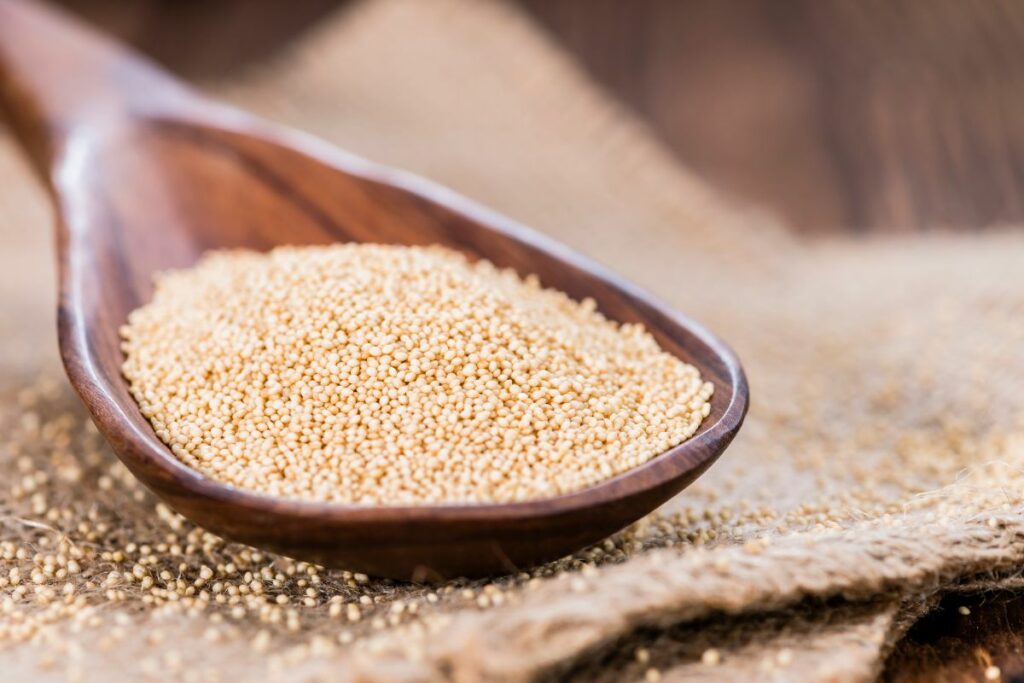Amaranth is often touted as a superfood because of its high protein content, and there are a number of advantages and benefits that are proven to be associated with this grain.
We took a closer look at the details and benefits of amaranth, as well as the laxative effects that have been reported by some users, to help ensure that you have all the information you need to make a healthy, nutritious choice, and boost your overall well-being.
What Is Amaranth?
Amaranth is an ancient grain native to Mexico, Central America, and South America. It has been cultivated for thousands of years in these regions, and it was used primarily as food or animal feed.
The plant grows up to 2 meters tall, and it can produce large amounts of seeds. It is also known as “the miracle seed” due to its ability to grow even when other plants fail during drought conditions.
Amaranth is rich in nutrients such as iron, calcium, magnesium, phosphorus, zinc, copper, manganese, vitamin B1, niacin, thiamine, riboflavin, folic acid, pantothenic acid, vitamin E, and fiber.
It contains more than 20% protein, which makes it one of the highest protein grains available today.
The Benefits Of Amaranth
There are many reasons why people choose to include amaranth in their diet. Some of them include:
High Protein Content
Amaranth is considered to be one of the best sources of protein on the planet. It provides about 20% protein per 100 grams, making it higher than most other grains.
This means that you get plenty of protein without having to eat too much of it, which can be healthy for weight loss and portion control.
Rich In Fiber
Amaranth is packed full of fiber, which helps keep your digestive tract clean and free from toxins. It also helps reduce cholesterol levels and lower blood pressure.
Low Glycemic Index
Amaranth has a low glycemic index (GI) compared to other grains like wheat, corn, rice, oats, barley, and rye.
This means that it does not cause rapid spikes in blood sugar levels, which can lead to insulin resistance and diabetes.
Good Source Of Iron
Amaranth is a good source of iron, which is essential for red blood cell formation and oxygen transport throughout the body.
Iron deficiency can result in fatigue, weakness, and poor concentration.
Nutrient Dense
Amaranth is nutrient-dense, meaning that it is loaded with vitamins and minerals. It is especially high in potassium, folate, and magnesium.
These nutrients play important roles in maintaining proper heart function, muscle strength, bone density, and energy metabolism.
Anti-Inflammatory Properties
Amaranth is known to contain anti-inflammatory properties, which may help relieve joint pain and inflammation.
It’s Good For Your Gut Bacteria
One benefit of amaranth is that it contains prebiotics, which feeds good bacteria in your digestive tract. These bacteria keep harmful bacteria under control and prevent infections.
Antioxidant Activity
Amaranth is rich in antioxidants, including beta-carotene, lutein, zeaxanthin, and lycopene.
They protect cells against damage caused by free radicals, which are unstable molecules that can harm DNA and proteins. Free radicals can contribute to cancer, cardiovascular disease, and aging.
Is Amaranth A Laxative?
Amaranth is often referred to as a laxative because it increases stool bulk and softens stools, and many users opt for this grain to alleviate symptoms of and as a natural remedy for constipation.
Here are some ways that amaranth can help treat constipation:
Increases Stool Bulk
When you consume amaranth, it absorbs water and expands inside your intestines. As a result, it creates a larger volume of stool that is easier to pass through your system.
Softens Stools
Because amaranth is so effective at absorbing water, it can soften stools and make them softer and smoother. This will allow your bowels to move more easily and naturally.
Improves Digestion
The fiber content of amaranth helps promote healthy digestion. It keeps your gut bacteria happy and prevents bad bacteria from taking over.
How To Use Amaranth For Constipation

You can use amaranth to treat constipation in several different ways:
Add It To Smoothies Or Juices
You can add amaranth to any fruit juice or smoothie recipe. Just mix 1 cup of cooked amaranth into a blender with 2 cups of fresh fruit and blend until smooth.
Make Oatmeal
Oatmeal is a great way to start your day. Simply cook 1/2 cup of amaranth in 3 cups of milk or almond milk. Stir well before serving.
Mix It Into Yogurt
Yogurt is another great food to include in your diet. Simply combine 1 cup of plain Greek yogurt with 1/4 cup of cooked amaranth. Mix well and refrigerate overnight. Serve chilled.
Add It To Soups
Soups are also an excellent way to eat amaranth. Cook 1/2 cup of uncooked amaranth in 4 cups of vegetable broth.
Bring to a boil, reduce heat, cover, and simmer for 20 minutes. Remove the lid and continue cooking for 5 additional minutes. Season with salt and pepper to taste.
Eat It On Its Own
If you want to try eating amaranth on its own, simply cook 1 cup of uncooked amaranth in 3 cups of water. Let sit for 10 minutes, then strain out the amaranth. You can serve it warm or cold.
Add It To Salads
Adding amaranth to salad recipes makes them even healthier! Try adding it to your favorite salad recipes like spinach salad, kale salad, or arugula salad.
Use It In Breads And Pasta
Bread and pasta dishes are perfect for using amaranth. Add it to your favorite bread recipes like banana nut bread, cinnamon rolls, or pumpkin bread.
Or, try making pasta dishes like lasagna, macaroni, and cheese, or spaghetti squash, and adding a touch of amaranth.
What Are The Benefits Of Eating Amaranth?
There are many benefits to eating amaranth. Some of these include:
It Helps Prevent Cancer
Another benefit of amaranth consumption is that it may help prevent cancer. Studies have shown that people who regularly eat foods high in antioxidants tend to be less likely to develop certain types of cancers.
According to one study, women who ate the most antioxidant-rich foods were 50% less likely to get breast cancer than those who ate the least number of antioxidants.
Another study found that people who consumed the highest amounts of antioxidants had lower rates of prostate cancer.
It Promotes Healthy Weight Loss
Amaranth contains a lot of protein, which means it is extremely filling and satisfying. When combined with other nutritious ingredients, this can lead to weight loss.
One study showed that when overweight adults ate a meal containing amaranth, they felt fuller longer than when they ate the same meal without amaranth.
It May Help With Diabetes
Diabetes is a condition where blood sugar levels become too high. This causes problems such as nerve damage, heart disease, blindness, kidney failure, and amputations.
People who have diabetes often need insulin injections to keep their blood sugar levels under control. However, some studies suggest that consuming foods rich in fiber and antioxidants may help to improve glucose metabolism.
Foods high in fiber, like amaranth, may help regulate blood sugar levels by increasing the rate at which carbohydrates are absorbed into the bloodstream.
Antioxidants, like vitamin C and beta-carotene, may also play a role in regulating blood sugar levels.
It Has Nutrients That Fight Disease
One of the main health benefits of amaranth is that it contains vitamins and minerals that fight disease.
These nutrients include iron, calcium, magnesium, zinc, copper, manganese, phosphorus, potassium, folate, niacin, thiamine, riboflavin, and pantothenic acid.
Final Thoughts
The bottom line is that amaranth has many great health benefits, and this includes acting as a relief for constipation and other digestive issues and helping to promote healthy weight loss.
If you want to add more fiber to your diet, then consider including amaranth in your meals.








